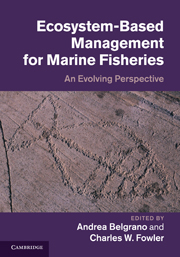Book contents
- Frontmatter
- Contents
- List of contributors
- Foreword
- Acknowledgments for cover artwork
- Introduction
- PART I CURRENT FORMS OF MANAGEMENT
- PART II ELEMENTS OF IMPORTANCE TO MANAGEMENT
- PART III USING PATTERNS
- 10 Science and management: systemically matching the questions
- 11 Sustainability, ecosystems, and fishery management
- 12 On the path to holistic management: ecosystem-based management in marine systems
- Afterword
- Index
- Plate section
- References
10 - Science and management: systemically matching the questions
from PART III - USING PATTERNS
Published online by Cambridge University Press: 17 February 2011
- Frontmatter
- Contents
- List of contributors
- Foreword
- Acknowledgments for cover artwork
- Introduction
- PART I CURRENT FORMS OF MANAGEMENT
- PART II ELEMENTS OF IMPORTANCE TO MANAGEMENT
- PART III USING PATTERNS
- 10 Science and management: systemically matching the questions
- 11 Sustainability, ecosystems, and fishery management
- 12 On the path to holistic management: ecosystem-based management in marine systems
- Afterword
- Index
- Plate section
- References
Summary
The key to wisdom is knowing all the right questions.
John A. Simone, Jr.The job is to ask questions – it always was – and to ask them as inexorably as I can. And to face the absence of precise answers with a certain humility.
Arthur MillerThe art and science of asking questions is the source of all knowledge.
Thomas BergerEffective management always means asking the right question.
Robert HellerAbstract
A primary objective of management is to achieve sustainable interactions and relationships. As individuals, this involves interactions with other individuals, other species, ecosystems, and the biosphere. It is the same for us as a species: management involves sustainable interactions – relationships with individuals, other species, ecosystems, and the biosphere (the non-human). Two crucial steps in carrying out such management are: (a) to ask clear management questions and (b) to carefully express matching research questions. Central to the message of this chapter is the point that the pairing of such questions must be tightly coupled. There must be a pair of questions for each of our many interactions with the non-human in order to achieve sustainability. The pairing of management questions and scientific questions must involve a consistency far beyond anything achieved in today's management. It must identify the kind of interaction and the levels of biological organization (e.g., individuals, species, and ecosystems) involved. Achieved effectively, the match between the two kinds of questions removes most of the barriers that currently exist between science and management – barriers of human origin that not only prevent achieving sustainability but have also led to many of the problems we face today.
- Type
- Chapter
- Information
- Ecosystem Based Management for Marine FisheriesAn Evolving Perspective, pp. 279 - 306Publisher: Cambridge University PressPrint publication year: 2011
References
- 1
- Cited by



